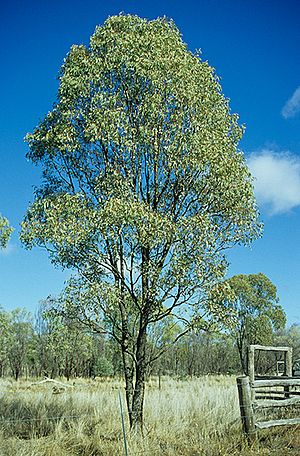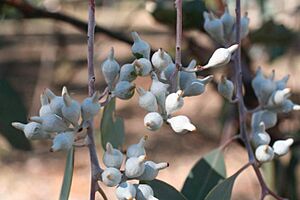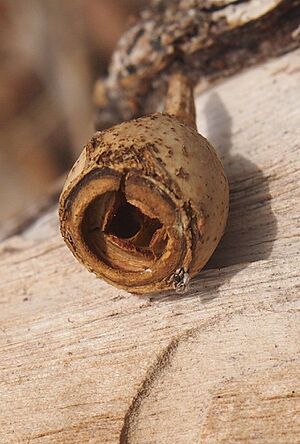Mountain coolibah facts for kids
Quick facts for kids Mountain coolibah |
|
|---|---|
 |
|
| Eucalyptus orgadophila growing in Carnarvon Station Reserve | |
| Scientific classification | |
| Genus: |
Eucalyptus
|
| Species: |
orgadophila
|
The mountain coolibah (scientific name: Eucalyptus orgadophila) is a medium-sized tree. It grows only in Queensland, Australia. This tree has rough, flaky bark on its lower trunk. The bark higher up is smooth and whitish-grey. It has long, narrow adult leaves. Its flowers are white and grow in groups of seven. The fruit looks like a small cup or barrel.
Contents
About the Mountain Coolibah Tree
The mountain coolibah is a type of eucalyptus tree. It usually grows to be about 15 to 20 metres (50 to 65 feet) tall. This tree has a special woody swelling at its base called a lignotuber. This helps the tree regrow if it gets damaged, for example, by fire.
Bark and Leaves
The lower part of the tree's trunk has rough, grey bark. This bark can be flaky or fibrous. Higher up, the bark is smooth and ranges from white to greyish.
Young mountain coolibah trees have dull, bluish leaves. These leaves are egg-shaped or almost round. They are about 30 to 60 millimetres (1.2 to 2.4 inches) long. As the tree grows, its adult leaves change. They become lance-shaped, which means they are long and narrow. These adult leaves are dull bluish to greyish-green on both sides. They can be 65 to 180 millimetres (2.5 to 7 inches) long.
Flowers and Fruit
The flowers of the mountain coolibah are white. They grow in groups of seven at the end of the branches. Each group of flowers is on a stalk called a peduncle. The individual flower buds are oval or pear-shaped. They are about 7 to 9 millimetres (0.28 to 0.35 inches) long.
Mountain coolibah trees usually flower between February and September. After the flowers, the tree produces fruit. The fruit is a woody capsule. It is shaped like a cup or a barrel. These fruits are about 7 to 11 millimetres (0.28 to 0.43 inches) long.
How This Tree Got Its Name
The mountain coolibah was first officially described in 1928. Two botanists, Joseph Maiden and William Blakely, gave it its scientific name. They wrote about it in Maiden's book, A Critical Revision of the Genus Eucalyptus.
The scientific name orgadophila comes from ancient Greek words. "Orgados" means "a meadow" or "a fertile spot with water." "Phila" means "loving." So, the name means "loving well-watered, fertile spots."
Where Mountain Coolibah Grows
This tree grows in woodlands in eastern Queensland, Australia. It often grows in groups of its own kind. You can find it on ridges and hills. Its range stretches from south of the Cape York Peninsula down to near Warwick.
Conservation Status
The Queensland Government has a list of plants and animals. This list helps protect nature. The mountain coolibah is classified as "least concern" under the Nature Conservation Act 1992. This means it is not currently at high risk of disappearing.



